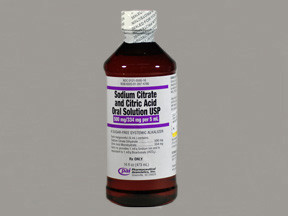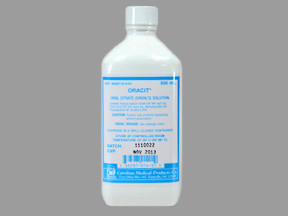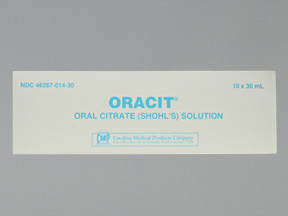CITRIC ACID/SODIUM CITRATE - ORAL
PHONETIC PRONUNCIATION: (SIT-rik AS-id/SOE-dee-um SI-trate)
COMMON BRAND NAME(S): Bicitra, Cytra-2, Oracit, Shohl's
GENERIC NAME(S): citric acid/sodium citrate
Uses
USES: This medication is used to make the urine less acidic. Urine that is less acidic helps the kidneys get rid of uric acid, helping to prevent gout and certain types of kidney stones (urate). This medication can also prevent and treat certain metabolic problems (acidosis) caused by kidney disease. Citric acid and citrate salts (which contain potassium and sodium) belong to a class of drugs known as urinary alkalinizers. Because some conditions require you to limit your intake of potassium and sodium, your doctor's choice of product may depend on how much potassium and sodium you can take.
How to use CITRIC ACID/SODIUM CITRATE - ORAL
HOW TO USE: Shake the container well before each dose. Take this medication by mouth, usually 4 times a day or as directed by your doctor. To help prevent diarrhea and stomach upset, take each dose after a meal, and mix your prescribed dose of medication in a full glass (4 to 8 ounces or 120 to 240 milliliters) of cold water or juice just before taking, or take as directed by your doctor. Drink the entire mixture slowly. Ask your doctor or pharmacist for further instructions. The liquid form of this medication must be mixed with at least 4 ounces (120 milliliters) of water or juice before taking. Refrigerating the mixture before drinking may improve the taste. Drink more water or juice after taking this medication unless otherwise directed by your doctor. Dosage is based on your medical condition and response to treatment. Take this medication as prescribed. Do not increase your dose or take this more often without your doctor's approval. Use this medication regularly to get the most benefit from it. To help you remember, take it at the same times each day. While taking this medication, you may need to test the pH (acidity) of your urine using special paper. The pH will help determine the proper dose. Consult your doctor or pharmacist for more information.
Side Effects
Precautions
Interactions
Overdose
Images
Reviews
Faq for CITRIC ACID/SODIUM CITRATE - ORAL
Citric acid/sodium citrate is a medication that contains a combination of citric acid and sodium citrate. It is used to treat certain conditions, such as kidney stones or urinary tract infections, by making the urine less acidic.
Citric acid/sodium citrate works by increasing the pH of urine, making it less acidic. This helps to dissolve certain types of kidney stones and prevent the formation of new stones. It can also help to treat urinary tract infections by creating an environment where bacteria cannot thrive.
Citric acid/sodium citrate is usually taken orally, as directed by your doctor or pharmacist. It is typically taken with meals or as directed, and can be mixed with water or other liquids if desired. It is important to follow the dosage instructions provided and not exceed the recommended dose.
Some common side effects of citric acid/sodium citrate include diarrhea, nausea, vomiting, stomach cramps, and increased urination. These side effects are usually mild and go away on their own. However, if you experience severe or persistent side effects, it is important to seek medical attention.
Yes, there are some precautions and warnings to be aware of. Citric acid/sodium citrate should be used with caution in individuals with kidney problems, heart problems, high blood pressure, or edema. It should also be used with caution in individuals on a low-sodium diet. It is important to discuss any existing medical conditions or medications with your doctor before taking this medication.
It is always recommended to consult with your doctor before taking any medication while pregnant or breastfeeding. They can evaluate your specific situation and determine if citric acid/sodium citrate is safe for you and your baby.
Citric acid/sodium citrate can potentially interact with certain medications, including diuretics, lithium, and certain blood pressure medications. It is important to inform your doctor or pharmacist of all the medications you are taking to avoid any potential interactions.
The time it takes for citric acid/sodium citrate to start working can vary depending on the individual and the condition being treated. It is important to follow the recommended dosing schedule and continue taking the medication as directed by your doctor, even if you do not immediately notice improvement.
It is important to complete the full course of treatment as prescribed by your doctor, even if your symptoms improve. Stopping the medication prematurely may allow the condition to return or worsen. If you have any concerns about stopping the medication, it is best to consult with your doctor.
Disclaimer
IMPORTANT: HOW TO USE THIS INFORMATION: This is a summary and does NOT have all possible information about this product. This information does not assure that this product is safe, effective, or appropriate for you. This information is not individual medical advice and does not substitute for the advice of your health care professional. Always ask your health care professional for complete information about this product and your specific health needs.





No Reviews Yet